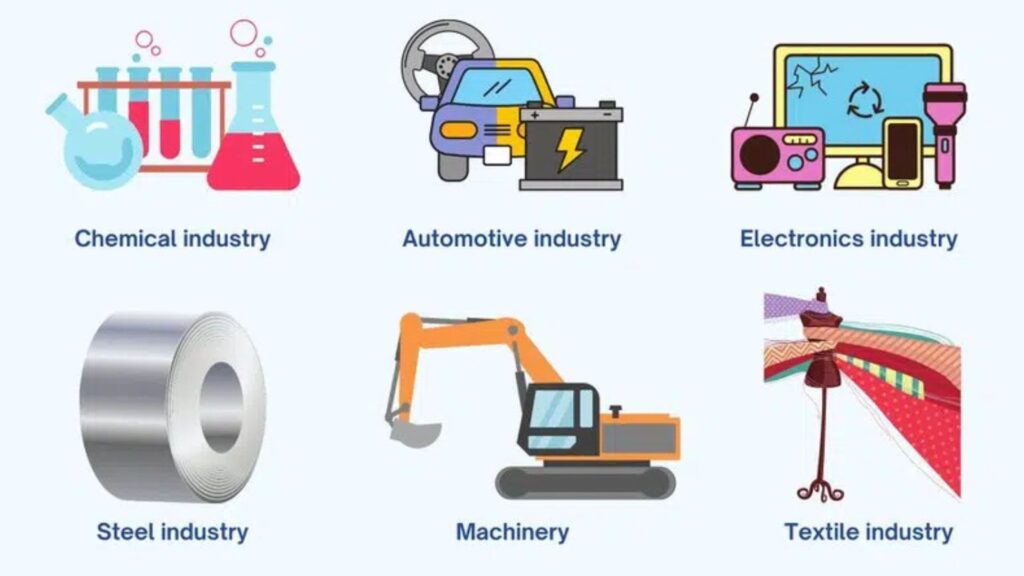The capital goods sector is the backbone of industrial growth. It includes companies that manufacture and supply machinery, equipment, tools, and infrastructure essential for production. These firms don’t sell directly to consumers—instead, they provide the equipment businesses need to create consumer goods and services.
For job seekers and professionals, knowing which companies dominate this field can help identify strong career opportunities. Below, we’ll break down the top companies in the capital goods sector, their business focus, career prospects, and the skills required to thrive.
🏭 Top Companies in the Capital Goods Sector
1. General Electric (GE)
General Electric is a diversified industrial giant involved in aviation, renewable energy, power, and healthcare. GE’s jet engines, turbines, and medical imaging equipment are used worldwide.
-
Careers: Engineers, project managers, IT specialists, healthcare tech developers.
-
Pros of Working Here: Global career mobility, strong research and development culture.
-
Cons: Frequent organizational restructuring.
-
Fun Fact: GE invests heavily in renewable energy, making it an attractive employer for sustainability-driven professionals.
2. Caterpillar Inc.
Caterpillar is the world’s largest manufacturer of construction and mining equipment, engines, and industrial gas turbines.
-
Careers: Mechanics, field engineers, logistics planners, data analysts.
-
Pros: Competitive pay, global opportunities, strong apprenticeship programs.
-
Cons: Work environments can be physically demanding and outdoors.
-
Fun Fact: Caterpillar offers robust training programs for skilled trades, making it a great place to start a hands-on career.
3. Siemens AG
Siemens specializes in electrification, automation, and digitalization. From smart infrastructure to renewable energy, Siemens drives Industry 4.0 innovation.
-
Careers: Automation engineers, AI developers, sustainability consultants.
-
Pros: Multicultural environment, focus on digital transformation.
-
Cons: Global scale can mean slow decision-making.
-
Fun Fact: Siemens is a leader in smart city technology, opening roles in urban development and clean energy.
4. Boeing
Boeing manufactures commercial airplanes, defense aircraft, and space technology. It’s one of the world’s largest aerospace companies.
-
Careers: Aerospace engineers, designers, cybersecurity specialists, program managers.
-
Pros: High pay, prestigious brand, cutting-edge aerospace innovation.
-
Cons: Sensitive to economic downturns and government contracts.
-
Fun Fact: Boeing invests in space exploration, creating career opportunities in satellite technology and future Mars missions.
5. 3M
3M is known for producing industrial goods, adhesives, abrasives, and safety equipment used in construction and healthcare.
-
Careers: R&D scientists, product managers, manufacturing technicians.
-
Pros: Innovation-driven workplace, strong sustainability initiatives.
-
Cons: Some roles involve repetitive tasks in labs or factories.
-
Fun Fact: 3M holds over 100,000 patents, making it one of the most inventive companies in the world.
6. Honeywell International
Honeywell develops aerospace systems, building technologies, and advanced materials.
-
Careers: Data scientists, aerospace engineers, automation specialists.
-
Pros: Growing focus on AI and automation, diverse business areas.
-
Cons: High expectations and performance-driven culture.
-
Fun Fact: Honeywell is at the forefront of quantum computing, offering unique career opportunities in tech-meets-industry.
7. Lockheed Martin
Lockheed Martin is a global leader in aerospace, defense, and security systems.
-
Careers: Software engineers, defense analysts, systems integrators.
-
Pros: Strong salaries, robust benefits, government-backed contracts.
-
Cons: Security clearance required for many positions.
-
Fun Fact: Lockheed Martin invests in AI-driven defense systems, blending tech and national security.
8. United Rentals
United Rentals is the largest equipment rental company in the world, supplying construction, industrial, and safety equipment.
-
Careers: Equipment operators, sales reps, field technicians.
-
Pros: Strong growth in construction demand, supportive training programs.
-
Cons: Work can be physically intense with travel demands.
-
Fun Fact: United Rentals plays a crucial role in disaster recovery projects, offering unique public service career paths.
9. ABB Ltd.
ABB is a leader in robotics, automation, and electrification technologies.
-
Careers: Robotics engineers, electrical engineers, renewable energy specialists.
-
Pros: Strong focus on sustainability and green energy.
-
Cons: Requires specialized technical knowledge.
-
Fun Fact: ABB robots are widely used in electric vehicle manufacturing, creating jobs in the EV boom.
10. Northrop Grumman
Northrop Grumman specializes in aerospace, defense, and cybersecurity technologies.
-
Careers: IT security specialists, aerospace engineers, project managers.
-
Pros: Job stability from government contracts, high salaries.
-
Cons: Limited remote flexibility due to security needs.
-
Fun Fact: Northrop Grumman built the James Webb Space Telescope, offering careers in groundbreaking space exploration.
Salaries and employee Numbers of Companies in Capital Goods
| Company | Industry Focus | Employees (approx.) | Headquarters | Average Salary Range |
|---|---|---|---|---|
| General Electric (GE) | Aviation, energy, healthcare | 170,000+ | Boston, MA | $70,000 – $130,000 |
| Caterpillar Inc. | Construction & mining equipment | 109,000+ | Deerfield, IL | $55,000 – $115,000 |
| Siemens AG | Automation, electrification, smart tech | 310,000+ | Munich, Germany (US HQ: Washington, D.C.) | $65,000 – $125,000 |
| Boeing | Aerospace & defense | 150,000+ | Arlington, VA | $75,000 – $145,000 |
| 3M | Industrial & safety products | 90,000+ | St. Paul, MN | $60,000 – $110,000 |
| Honeywell | Aerospace, automation, materials | 97,000+ | Charlotte, NC | $70,000 – $120,000 |
| Lockheed Martin | Aerospace & defense | 122,000+ | Bethesda, MD | $80,000 – $150,000 |
| United Rentals | Equipment rentals | 22,000+ | Stamford, CT | $50,000 – $100,000 |
| ABB Ltd. | Robotics, electrification, automation | 105,000+ | Zurich, Switzerland (US HQ: Cary, NC) | $65,000 – $120,000 |
| Northrop Grumman | Defense, aerospace, cybersecurity | 95,000+ | Falls Church, VA | $85,000 – $155,000 |
🔑 Skills Needed to Succeed in the Capital Goods Industry
Landing a job in the capital goods field requires a blend of technical, analytical, and soft skills. Since this industry drives global manufacturing, infrastructure, and technology, job seekers who invest in upskilling are far more competitive.
1. Technical Skills
-
Engineering Knowledge: Mechanical, electrical, civil, or aerospace engineering skills are highly valued.
-
Computer-Aided Design (CAD): Tools like AutoCAD, SolidWorks, and CATIA are widely used.
-
Robotics & Automation: Companies like ABB and Siemens need specialists in robotics, PLCs, and AI-driven automation.
-
Data Analytics: Roles increasingly require Python, SQL, and MATLAB to analyze production efficiency.
Where to Learn:
-
MIT OpenCourseWare for engineering fundamentals.
-
Coursera’s Mechatronics Specialization for robotics and automation.
-
Udemy’s AutoCAD Training for CAD software skills.
2. Project Management Skills
-
Lean Six Sigma & Kaizen: Efficiency-driven certifications are highly sought after.
-
PMP Certification: Widely recognized for managing large-scale engineering projects.
-
Agile & Scrum: Especially useful for digital transformation in capital goods.
Where to Learn:
3. Digital & Industry 4.0 Skills
-
IoT & Smart Manufacturing: Understanding how devices communicate in smart factories.
-
AI & Machine Learning: Applied to predictive maintenance, quality control, and logistics.
-
Cybersecurity: Essential for defense contractors like Lockheed Martin and Northrop Grumman.
Where to Learn:
-
IBM AI Engineering on Coursera for AI.
-
edX Cybersecurity courses for defense-related skills.
4. Soft Skills
Even though capital goods companies are technical by nature, soft skills often make the difference in career progression:
-
Problem-Solving: Quickly addressing equipment failures or supply chain issues.
-
Communication: Explaining complex technical topics to non-technical stakeholders.
-
Adaptability: Thriving in fast-changing environments like renewable energy and aerospace.
-
Teamwork: Projects often span across global teams.
5. Education & Certifications
-
Degrees: Engineering (Mechanical, Electrical, Civil), Supply Chain Management, Computer Science.
-
Trade Schools: For technicians, mechanics, and equipment operators.
-
Certifications:
-
Lean Six Sigma (efficiency)
-
PMP (project management)
-
OSHA Safety Certification (construction & industrial jobs)
-
AWS Cloud Certification (for digital transformation roles in companies like Honeywell & GE).
-
🚀 Career Outlook
According to the U.S. Bureau of Labor Statistics, capital goods careers will remain steady, with strong growth in renewable energy, aerospace, and automation. Engineers, technicians, and software-driven roles are in especially high demand.
💡 Final Thoughts
The capital goods sector offers diverse career opportunities in engineering, management, and innovation. Companies like GE, Caterpillar, Siemens, Boeing, and Honeywell are shaping global industries while creating thousands of well-paying, stable jobs.
Platforms like WiseWorq make it easier to explore these companies, compare workplace culture, and discover the right career path in capital goods.


